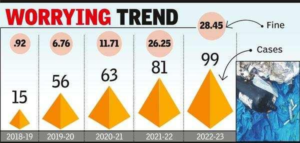
BIOMEDICAL WASTE: 314 hospitals, labs, and clinics paid Rs. 74 lakhs fine in 5 years.

An Impetuous and heedless disposal of Bio medical waste is a discernible act of lack of minimum responsibility and required diligence. Aftermath of such callous acts is not only treacherous to environment but also poses an imminent and hazardously potential threat to public health at large.
It is salient that such detrimental/ cataclysmic activities should not be overlooked and be addressed as a felony that demands immediate attention for prudent management and regulation.
BIO- WASTE DISPOSAL: A CALL FOR IMMINENT ACTION:
An Impetuous and heedless disposal of Bio medical waste is a discernible act of lack of minimum responsibility and required diligence. Aftermath of such callous acts is not only treacherous to environment but also poses an imminent and hazardously potential threat to public health at large. It is salient that such detrimental/ cataclysmic activities should not be overlooked and be addressed as a felony that demands immediate attention for prudent management and regulation.
UPSURGE IN VIOLATIONS OF BIOMEDICAL WASTE DISPOSAL NORMS BY HOSPITALS.
The abysmal management of bio medical waste disposition has become increasingly clear through escalated indulgence of several government hospitals, clinics & pathology labs dumping their waste on open grounds and numerous Impeding actions directed by municipal corporations to modulate these entities from doing so.

Not long ago, from the year 2022 to 2023, the Nuisance Detection Squad (NDS) of Nagpur Municipal Corporation (NMC) has seized 99 establishments majorly involving government hospitals for imprudent violation of norms governing bio waste management and imposed penalty of Rs. 28.45 lakhs on the entities. Such violations are not just pertinent to that year, in the previous year, 2021, the municipal corporation had already penalized 81 establishments for violation of norms and levied a penalty of Rs. 26.25 Lakhs.
Likewise, a Private hospital in Bhubaneswar, Odisha was rendered to have disposed biomedical waste near a public bus station as discovered by Bhubaneswar Municipal Corporation during their inspection at the hospital vicinity and recovered a fine of Rs 1 Lakh.
To exacerbate the growing list, The centre for pollution control, Varanasi had ascertained that an average of 250 grams of medical waste was being generated per bed in each hospital on a day to day basis along with additional divulgence of how over a 400 medical entities in the city still did not adhere to advisable standards of proper medical waste disposal as expounded in Bio- Medical waste Management and Handling Rules, 1998.
Such continued ordeals of medical entities probing to repudiate the norms mandated for proper disposal only reflect the prejudiced failure of the law in pursuant to strict apprehension, assiduous vigilance and supervising. The fact that there still exist myriad number of entities around each corner of districts, cities and villages veiled due to undistinguished vigilance of governmental bodies is bothersome.
The efficacious implementation of provisions of legal statutes governing management and regulation of disposal of bio medical waste, especially when its directly necessitating welfare of environment and public health, calls for severe pronouncement regarding term of imprisonment and higher rates penalties in case of violation. Further, it should unfailingly be followed by setting up of an exclusive supervisory and regulating body that scrupulously contemplates whether the entities are adhering to norms or not.
HAZARDUOUS AFFECTS OF THE BIO MEDICAL WASTE
Bio medical waste contains potential hazardous remains such as health care waste, infectious waste, sharp waste, body part waste, chemical or pharmaceutical waste and radioactive, cytotoxic waste.
These waste accumulated by medical entities are very diverse in extent. Although a substantial number of items produced by the entities could be non-hazardous comprising of plastic covers, cardboard boxes, unused masks etc, on the other side of the coin, hospitals do produce fatal infectious waste that has been contaminated with blood or other bodily fluids sourced from jettisoned diagnostic samples, autopsies or patients in isolation. India ,being a densely populated country with minimal hygiene counters, could have adverse effects with unforeseeable dicey impact on public health because of unaccounted reckless disposal of infectious medical waste.
It is needless to say how deposits of Sharp waste such as syringes, blades, scalpels had accounted for numerous deaths of several animals that are in wander of food or general stroll for that matter in the streets. It could not be any more barbarous or inhuman.
All accumulated chemical waste produced in medical laboratories, heavy metals, radio-active waste containing radionuclides, radio therapeutic materials and radio-active diagnostic material, cataclysmically effects the environment.
The two big vices for such mishaps and inefficacy could be for the contribution of Lack of awareness about the jeopardy due to abysmal bio waste disposal management and low priory given to the topic in the country. Even though, India has come up with one of the well designed and planned regulatory legal framework, many elements are impeding the act to be potential to totally eradicate the problem.
LEGAL FRAMEWORK IN INDIA GOVERNING THE DISPOSAL OF BIO MEDICAL WASTE
The provisions of Bio Medical Waste (Management and Handling) Rules, 1998 provide a legal framework to regulate the management and handling of Bio-Medical waste which has been emerged after careful perusal and review of the existing Bio- Medical waste Management and Handling Rules, 1998 by the government.
These provisions and rules put forth in the act will apply to all those persons involved in the activities of generation, collection, treatment, transportation and disposal of biomedical waste from hospitals not excluding AYUSH ( Ayurveda, Yoga and Naturopathy, Unani, Siddha and Homeopathy), clinics, animal houses, vaccination centres, blood banks etc.







